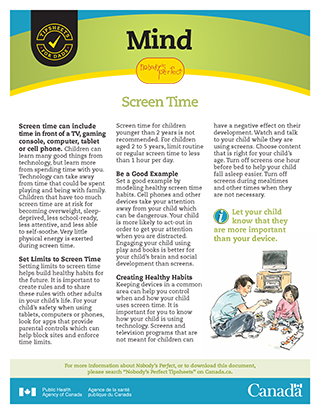Mind: Screen Time

Download the alternative format (PDF format, 335 KB, 2 pages)
Organization: Public Health Agency of Canada
Screen time can include time in front of a TV, gaming console, computer, tablet or cell phone. Children can learn many good things from technology, but learn more from spending time with you. Technology can take away from time that could be spent playing and being with family. Children that have too much screen time are at risk for becoming overweight, sleep-deprived, less school-ready, less attentive, and less able to self-soothe. Very little physical energy is exerted during screen time.
Set Limits to Screen Time
Setting limits to screen time helps build healthy habits for the future. It is important to create rules and to share these rules with other adults in your child’s life. For your child's safety when using tablets, computers or phones, look for apps that provide parental controls which can help block sites and enforce time limits.
Screen time for children younger than 2 years is not recommended. For children aged 2 to 5 years, limit routine or regular screen time to less than 1 hour per day.
Be a Good Example
Set a good example by modeling healthy screen time habits. Cell phones and other devices take your attention away from your child which can be dangerous. Your child is more likely to act-out in order to get your attention when you are distracted. Engaging your child using play and books is better for your child’s brain and social development than screens.
Creating Healthy Habits
Keeping devices in a common area can help you control when and how your child uses screen time. It is important for you to know how your child is using technology. Screens and television programs that are not meant for children can have a negative effect on their development. Watch and talk to your child while they are using screens. Choose content that is right for your child’s age. Turn off screens one hour before bed to help your child fall asleep easier. Turn off screens during mealtimes and other times when they are not necessary.
Let your child know that they are more important than your device.
Fun & Easy Activities
Games to play in the snow
Practice your throwing. Make a large target on a piece of cardboard. Hang it to a tree and throw snowballs at it to hit the bullseye.
Play hide and build. Freeze coloured ice cubes using food coloring. Go outside and hide the cubes in the snow. Have your child use scoops or spoons to dig and find the coloured ice cubes. Then use them as blocks and build things.
Make things for the birds. String cranberries, cereal and popcorn on a thread or fishing line. Hang it in the trees to attract the birds. Watch and count how many different kinds of birds you attract.
Games to play in the rain
Walk this way. Go for a walk. Take turns being things like a frog walking/jumping/swimming in the puddles. Be sure to look for a rainbow!
Digging for worms. Look for worms as they move around the ground. Count how many can you find. Will your preschooler dare touch one? Will you?
Find tracks. Look for animal tracks in the mud. Try to guess which animal made the tracks. Take pictures of them and when inside look to see who made the tracks.
Games to play in the sun
Make mud pies or sand castles. Use sand molds, plastic cups and large spoons to help create a mud meal or a city.
Water play. Fill buckets with water and float small boats or move water from one bucket to another with a spoon. Collect rocks and wash them. Use big paint brushes and paint the sidewalk, fence etc. It is a clean and easy way to be creative.
Make an obstacle course. Even your toddler will love crawling under a blanket, or jumping through a hula hoop or even off of rocks. Be creative and use whatever you have outside!
Take a camping trip. Set up a tent in your yard. Take board games and snacks. Your child can take a nap in the tent with you.
Activities adapted from Dads in Gear: Fun Game Ideas for Rainy Day Play
The Public Health Agency of Canada gratefully acknowledges the collaboration and expertise of Dad Central Canada (www.dadcentral.ca) and their national network in the development of the Nobody’s Perfect tipsheets for dads.